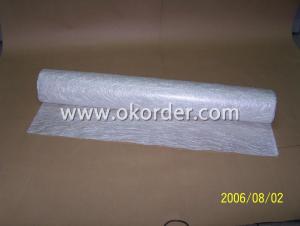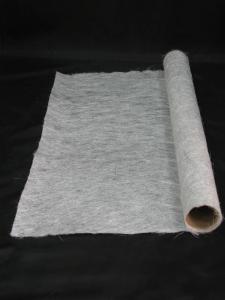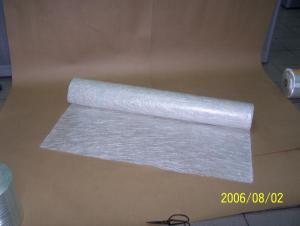C-glass Chopped Strand Mat Fiberglass Raw Material
- Loading Port:
- China Main Port
- Payment Terms:
- TT or LC
- Min Order Qty:
- 20000 kg
- Supply Capability:
- 600000 kg/month
OKorder Service Pledge
OKorder Financial Service
You Might Also Like
Fiberglass chopped strand mat is a non-woven E-or C-glassfiber mat, product manufactured by spreading continuous filament roving of 50mm in length randomly and uniformly in combination with polyester binder in powder form(or other binder in emulsion form). This product is characterized by good combination of resin, easy operation, good wet strength retention, good laminate transparency and low cost. It is suitable for the applications of hand lay-up FRP molding, such as: various sheets and panels, boat hulls, cooling towers, corrosion resistant, vehicles etc.
Product Function
Fiberglass chopped strand mat is chopped using the “E” chopped glass and emulsion adhesive bond. It is suitable for hand lay and can enhance the unsaturated polyester resins.
Packaging & Delivery of C-glass Chopped Strand Mat
Packaging Detail: | cartons and pallets |
Delivery Detail: | within two weeks |
Main Features of C-glass Chopped Strand Mat
C-glass fiber chopped strand mat:
1. good wet-out
2. evenly distribution of fiber and binder
3. high mechanical strength etc.
Specification C-glass Chopped Strand Mat
We could provide E-Glass Powder Chopped Strand Mat and E-Glass Emulsion Chopped Strand Mat.
Specs | Roll length(m) | Width(mm) | Roll weight(kg) | Compatible Resin |
EMC225 | 1040mm | 144 | 30 | UP VE |
EMC300 | 1040mm | 96 | 30 | UP VE |
EMC380 | 1040mm | 80 | 30 | UP VE |
EMC450 | 2080mm | 64 | 60 | UP VE |
EMC600 | 2080mm | 48 | 60 | UP VE |
EMC900 | 2080mm | 32 | 60 | UP VE |
The products is raw material to produce FRP products.
Binder type: Emulsion or Power
Packing: by carton or by pallet, or as your requested
Pictures of C-glass Chopped Strand Mat
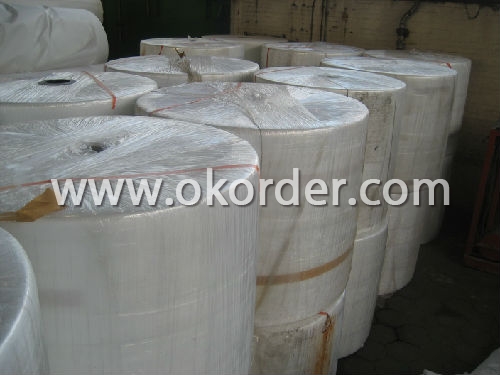
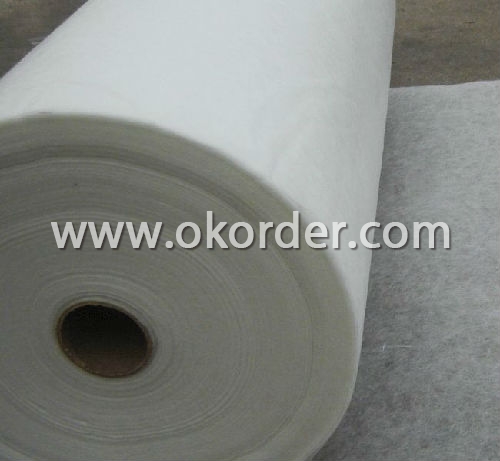
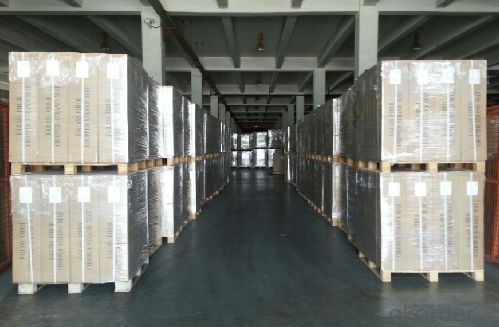
- Q:How does fiberglass mat tissue perform in terms of heat insulation?
- Fiberglass mat tissue performs well in terms of heat insulation due to its low thermal conductivity, which helps to minimize heat transfer. It acts as a barrier, preventing the escape of heat and keeping the surrounding environment insulated.
- Q:What is the expected lifespan of fiberglass mat tissue in sports facility applications?
- The lifespan of fiberglass mat tissue in sports facility applications can differ based on various factors, including material quality, maintenance level, and usage conditions. However, fiberglass mat tissue generally has a lengthy lifespan and is recognized for its durability. When installed and maintained correctly, fiberglass mat tissue can endure for multiple decades. It is resistant to corrosion, rot, and degradation, making it suitable for use in sports facilities that face moisture, humidity, and other environmental factors. To ensure the longest lifespan for fiberglass mat tissue in sports facility applications, regular inspections, cleanings, and repairs may be necessary. Additionally, it is crucial to adhere to the manufacturer's recommendations for installation and maintenance to achieve optimal performance and longevity. It is important to note that despite its durability, fiberglass mat tissue may still experience gradual wear and tear, particularly in high-impact areas or facilities with heavy usage. In such cases, periodic replacements or repairs may be needed to maintain the material's integrity and functionality. All in all, fiberglass mat tissue is a dependable and long-lasting choice for sports facility applications. With proper care and maintenance, it can deliver exceptional performance and durability for numerous years.
- Q:Can fiberglass mat tissue be used for insulating metal roofs?
- Indeed, insulating metal roofs is possible with the utilization of fiberglass mat tissue. The thermal properties and durability of fiberglass make it a favored selection for roof insulation. By obstructing heat transfer, it aids in maintaining a cooler interior during scorching weather and a warmer one during chilly weather. Moreover, fiberglass is lightweight and straightforward to install, rendering it a pragmatic choice for metal roofs. Generally, the fiberglass mat tissue is positioned between the metal roof panels and the building's interior, furnishing an efficient insulation layer.
- Q:Is fiberglass mat tissue resistant to moisture?
- Fiberglass mat tissue, indeed, exhibits resistance to moisture. By tightly weaving strands of glass fibers and subsequently bonding them with a resin, this tissue fabricates a barrier that effectively thwarts the infiltration of moisture. Consequently, the moisture-resistant properties of fiberglass mat tissue render it exceptionally suitable for deployment in scenarios where water exposure or high humidity is anticipated. Moreover, this tissue's resistance to moisture aids in averting the proliferation of mold or mildew, thereby establishing it as an appropriate selection for environments prone to dampness.
- Q:How is fiberglass mat tissue used in the production of storage containers?
- Fiberglass mat tissue is commonly used in the production of storage containers to reinforce and strengthen the structure. It is typically applied as a layer between the layers of resin and fiberglass to improve the container's durability and resistance to cracking or breaking. The fiberglass mat tissue acts as a reinforcement material, providing additional strength and stability to the container, making it more suitable for heavy-duty storage purposes.
- Q:Does anyone know the hardness value of the heat conductive gasket? Does it contain the hardness of the carrier (glass fiber)?
- SHORE hardness is only for the hardness of the heat conductive gasket itself
- Q:What is the thermal resistance of fiberglass mat tissue?
- The thermal resistance of fiberglass mat tissue is determined by several factors, including the mat's thickness, fiber density, and the inclusion of additional materials or coatings. In general, fiberglass exhibits low thermal resistance, signifying its excellent heat conductivity. Nevertheless, when employed as insulation, the thickness and density of the fiberglass mat can elevate its thermal resistance, enhancing its ability to reduce heat transfer. It is crucial to acknowledge that precise thermal resistance values may differ based on the product and application, hence it is advisable to consult the manufacturer's specifications for precise information.
- Q:Is fiberglass mat tissue suitable for insulation in hospitals?
- Yes, fiberglass mat tissue is suitable for insulation in hospitals. Fiberglass mat tissue is a lightweight and cost-effective material that offers excellent thermal insulation properties. It can effectively regulate temperature and reduce heat loss, making it an ideal choice for hospitals where maintaining a comfortable and controlled environment is crucial. Additionally, fiberglass mat tissue is non-combustible and resistant to mold, ensuring a safe and hygienic environment in hospitals. Its durability and ease of installation also make it a practical choice for insulation in healthcare facilities.
- Q:How does fiberglass mat tissue perform in terms of air permeability?
- Fiberglass mat tissue typically has low air permeability. The tight weave and construction of the fiberglass strands used in the mat tissue make it less porous, allowing very little air to pass through it. This characteristic makes fiberglass mat tissue a suitable material for applications where air permeability needs to be minimized, such as in insulation or filtration systems. By restricting the passage of air, fiberglass mat tissue helps to enhance thermal insulation properties and improve filtration efficiency.
- Q:Is fiberglass mat tissue resistant to compression?
- Yes, fiberglass mat tissue is resistant to compression. Fiberglass mat tissue is made up of multiple layers of fine glass fibers that are bonded together with a binder. This composition gives it a high level of structural integrity and strength, making it resistant to compression forces. It can withstand heavy loads without deforming or losing its shape. This characteristic makes fiberglass mat tissue widely used in various applications, such as construction, automotive, aerospace, and marine industries, where compression resistance is crucial. Additionally, fiberglass mat tissue is also known for its excellent dimensional stability, which further enhances its resistance to compression.
1. Manufacturer Overview |
|
|---|---|
| Location | Zhejiang, China |
| Year Established | 1969 |
| Annual Output Value | Above US$ 150 Million |
| Main Markets | overseas companies in Hongkong, Canada, South Africa, South Korea, India, Italy, Singapore, France and many other countries and regions. |
| Company Certifications | ISO9001;ISO14001 |
2. Manufacturer Certificates |
|
|---|---|
| a) Certification Name | |
| Range | |
| Reference | |
| Validity Period | |
3. Manufacturer Capability |
|
|---|---|
| a)Trade Capacity | |
| Nearest Port | Shanghai |
| Export Percentage | 40%-50% |
| No.of Employees in Trade Department | 21-50 People |
| Language Spoken: | English |
| b)Factory Information | |
| Factory Size: | Above 5000,000 square meters |
| No. of Production Lines | Above 5 |
| Contract Manufacturing | |
| Product Price Range | Average |
Send your message to us
C-glass Chopped Strand Mat Fiberglass Raw Material
- Loading Port:
- China Main Port
- Payment Terms:
- TT or LC
- Min Order Qty:
- 20000 kg
- Supply Capability:
- 600000 kg/month
OKorder Service Pledge
OKorder Financial Service
Similar products
New products
Hot products
Hot Searches
Related keywords
